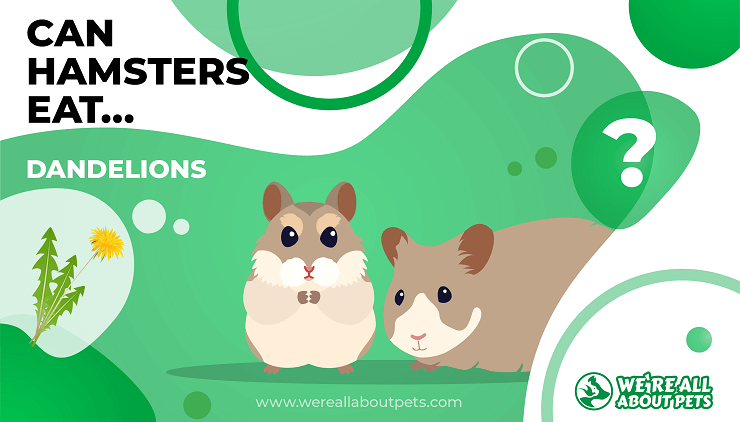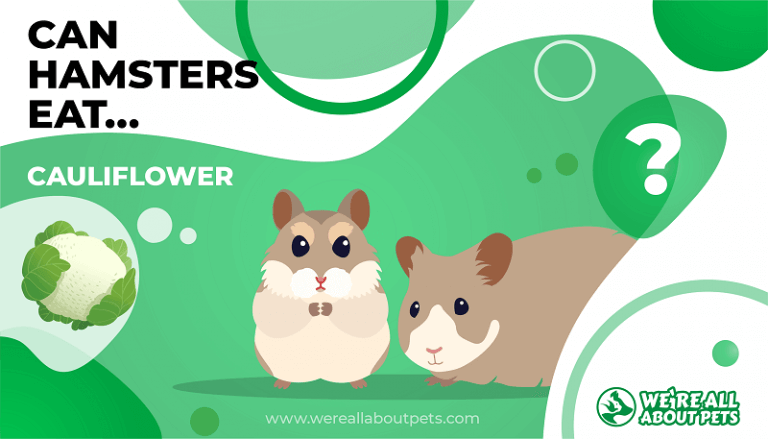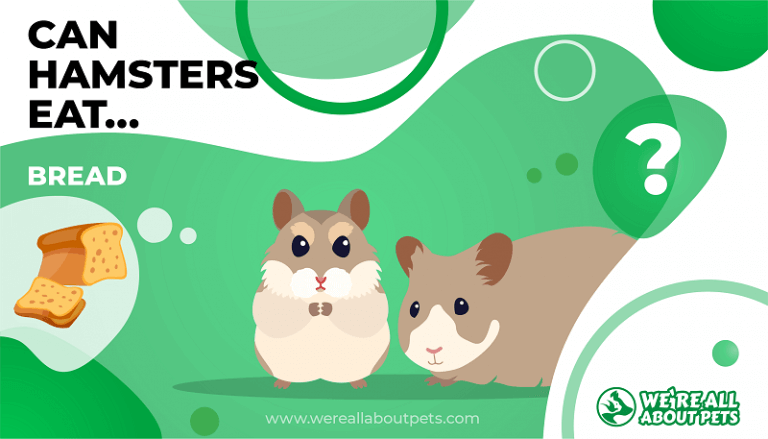Can Hamsters Eat Raspberries?
This page contains affiliate links. We may earn money or products from the companies mentioned in this post through our independently chosen links, which earn us a commission. Learn More
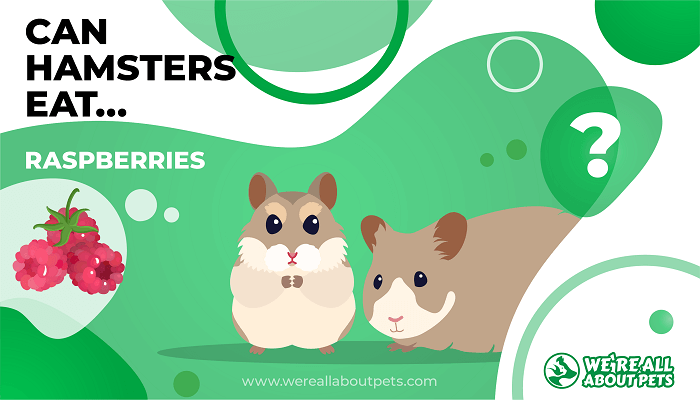
We love them in early summer, all by themselves or perhaps with a scoop of ice cream. There’s no doubt about it: Whether enjoyed straight from the bush or baked into a luscious tart, raspberries are delicious! The question is, are raspberries OK for hamsters? And, if you can give raspberries to a hamster, how much can they have at once?
The good news is that it’s fine to give a hamster raspberries, but there are a few things you should know before you treat your little friend to a bright red berry treat!
Keep reading: In a few minutes, you’ll know all about raspberries for hamsters.
Raspberries Nutrition Stats
Even though they’re one of the lowest-calorie fruits around, raspberries give you quite a bit of nutrition!
In a one-cup serving of ripe, fresh raspberries, you’ll get about:
- 64 calories
- 14/7 g carbohydrates
- 8 g fiber
- 5 g protein
- .8 g fat
Raspberries Nutritional Facts
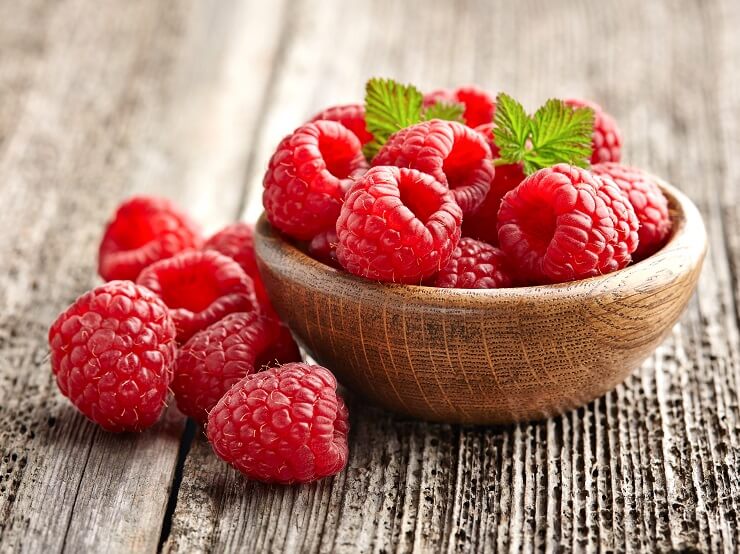
Raspberries are delicious but inside each tiny red package, there are lots of vitamins, minerals, and antioxidants to help you and your hammy stay healthy.
That same one-cup serving gives you approximately:
- 6 iu vitamin A
- 186 mg potassium
- 2 mg vitamin C
- .1 mg vitamin B6
- .8 mg manganese
- 1 mg magnesium
- .4 mg pantothenic acid
- .1 mg copper
- 7 mg phosphorus
- 7 mg calcium
- 6 mcg vitamin K
- 8 mcg folate
- 1 mg choline
Can Hamsters Have Raspberries?
Absolutely! Raspberries are high in fiber and relatively low in sugar compared with some other fruits. They’re among the nicest treats you can give your hamster – just be sure to offer the right amount.
Are Raspberries Good For Hamsters?
Since they’re a great source of nutrition, raspberries can be very good for your hamster. But it’s easy to offer too much of a good thing, so keep moderation in mind.
Do Hamsters Like Raspberries?
Not many things in life are certain but here’s one thing you can count on: Hamsters love raspberries. In fact, most will go crazy for this yummy little fruit!
How Much Raspberries Can A Hamster Eat?
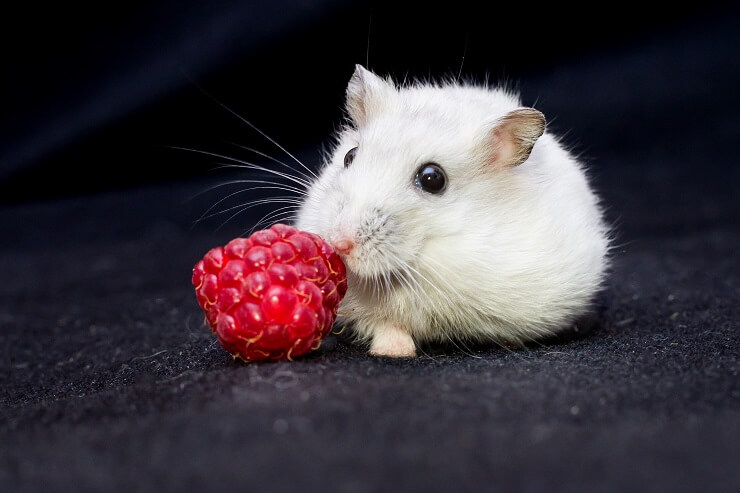
While you might enjoy raspberries by the bowlful, your fuzzy friend has to take a moderate approach. Here’s how much raspberry a to feed your hamster:
| Age | Amount |
| Baby hamster | None |
| Adult hamster | 1 large raspberry or 2 small raspberries |
This might not sound like much but to your hamster, a big berry is a good-sized treat – kind of like a large apple or orange is to you!
- You can give your hamster a full serving of raspberries if they’re already accustomed to eating vegetables and fruits. Do watch for signs of diarrhea or gas; if your hammy seems uncomfortable or has loose stools, cut their raspberry serving size by half next time and repeat the observation process again.
- If you just recently brought your hamster home and you’re not sure if they’ve been eating fresh foods, start with something milder like a piece of cucumber or spinach. After a successful week of gentle veggies, you can finally treat your new friend to a little bit of raspberry.
- When the time comes, offer only tiny amounts of raspberry at first and gradually work your way toward a full serving. Give them about half a small raspberry as an introduction and over the next 12 hours, watch for signs of diarrhea and indigestion. So long as everything is normal, you can gradually increase the amount of raspberries you give your hamster.
How Often Can A Hamster Eat Raspberries?
If your hamster likes raspberries – and we’re pretty sure that they will – they can have a berry or two once or twice per week, but not on the same day as you’re offering other fruits. Too much sugar can lead to obesity and diabetes over time; by keeping your hamster’s intake low, you’re helping them live a healthier, more comfortable life.
The Correct Diet Is Important
Good-quality hamster food contains all the nutrients your pet needs for good health. Check your hamster’s food package to see what the correct serving size is, and ensure that they get the right amount each day.
We know that variety is the spice of life, and there’s nothing cuter than a hamster enjoying different foods! Plus, offering variety mimics a hamster’s natural diet a little more closely.
Besides species-specific food, here’s what else to feed a hamster:
- Unlimited amounts of fresh Timothy hay for tunneling, nesting, and nibbling. Along with comfortable hamster bedding, this essential helps your hammy stay busy – and makes their hamster habitat feel like home.
- About a teaspoon of birdseed, just once per week. This isn’t a must-have, but it’s a nice extra that can help keep your pet feeling and looking their best.
- Unlimited access to clean, fresh water; remember to take a moment out to rinse and refill your hamster’s drinking bottle at least once each day.
- Tiny bits of fruit and vegetables every day or every other day. Pick up any leftovers right away to prevent your pet from caching them. If fresh food spoils, it can make your hamster sick.
While we’re on the subject of your hamster’s health, let’s talk teeth.
Lots of new hamster parents are surprised when they learn that those little hamster teeth never stop growing. Luckily, hamsters keep their teeth at the proper length all by themselves – you just have to give them something safe to chew.
Hamster toys, hay cubes, coconut shells, and unbleached loofah are some popular options.
What Are Other Healthy Alternatives To Raspberries In A Hamster’s Diet?
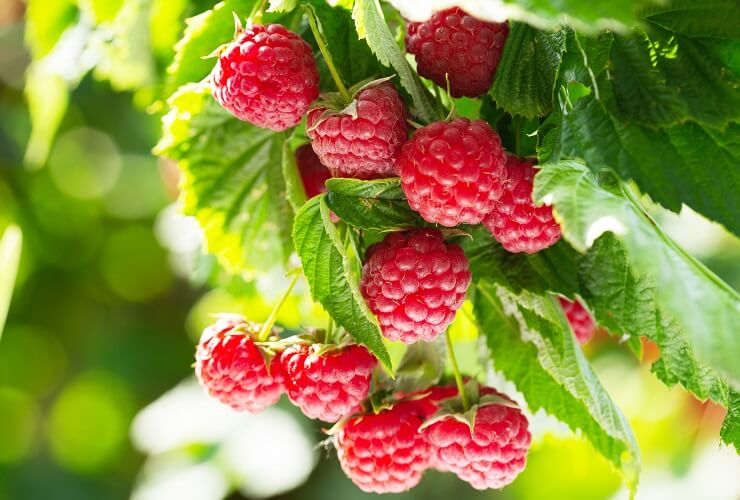
Since hamsters can eat all kinds of interesting things, it’s a good idea to round out their diet by offering plenty of variety.
Here are some suggestions to help you get started:
- buttercrunch lettuce
- green beans
- sweet potato
- tomato
- broccoli
- broccolini
- cauliflower
- okra
- bok choy
- yu choy
- carrot
- carrot tops
- romaine
- potato (cooked only)
- beets
- beet tops
- sprouts
- arugula
- swiss chard
- watercress
- asparagus
- baby corn
- artichoke
- sweet corn
- cucumber
- summer squash
- winter squash
- pumpkin
- bell pepper
- zucchini
- celery
- parsnip
- cabbage
- basil
- cilantro
- mint
- parsley
- endive
- escarole
- butter lettuce
- bibb lettuce
- rocket
Even though most veggies and fruits and vegetables are safe for your pet and beneficial in some way, there are a few outliers. Some foods are toxic to hamsters and you’ll want to avoid them. Others are dangerous because of excess acidity or far too much sugar.
The best way to keep your hamster safe is to spend a few minutes researching!
This way, you’ll know what’s safe, plus you’ll gain insight into the right way to offer each item to your little friend.
For now though, giving your hamster raspberries is a delicious way to add important nutrients to their diet while making life even more fun!
Frequently Asked Questions
Are raspberries safe for hamsters?
Absolutely. Just wash them well and remember that small amounts are best.
Can raspberries make my hamster sick?
Yes, but it’s only really likely if your hamster eats too many raspberries at once. Stick with the recommended serving size and your pet should be fine. Do remember the importance of making a gradual introduction!
Can hamsters eat wild raspberries?
Yes! Hamsters can have wild raspberries. Just be sure that the berries haven’t been exposed to toxic sprays before offering them to your pet or enjoying them yourself.
Can hamsters have raspberry leaves?
Yes! Hamsters can have one or two raspberry leaves. Be sure that the leaves are clean and ensure that they haven’t been sprayed with toxic pesticides.






